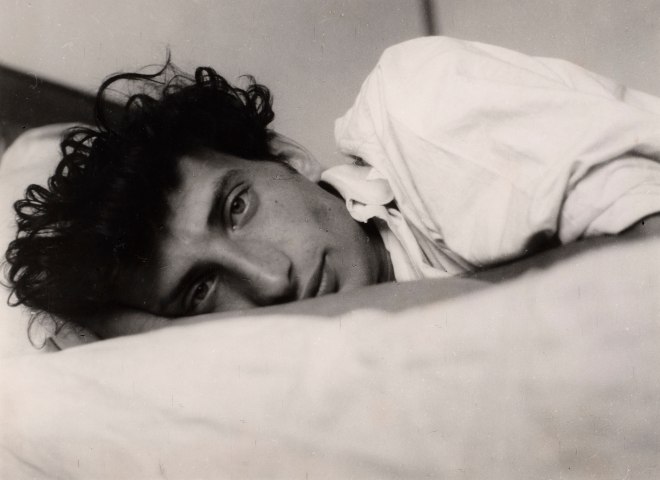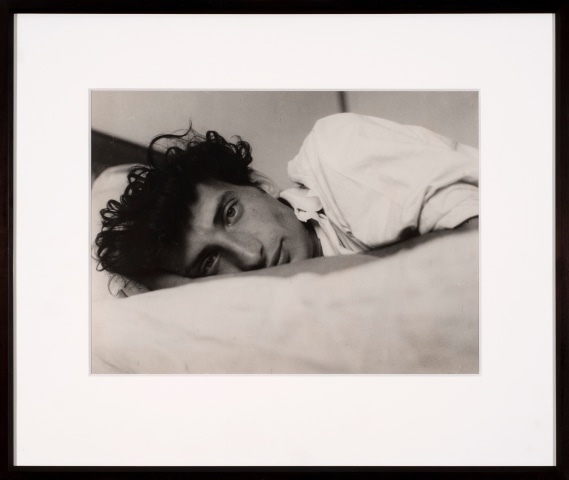Edouard Boubat (French, 1923-1999)
Self-Portrait, 1948
Vintage gelatin silver print
Inscribed as titled, and dated '1948' by the artist (in pencil on the reverse)
Inscribed as titled, and dated '1948' by the artist (in pencil on the reverse)
30 x 40.5cm
P1007 C
Download the catalogue note as a PDF here. Édouard Boubat (1923-1999) was a renowned French photographer celebrated for his poetic and humanistic approach to capturing the world around him. Often...
Download the catalogue note as a PDF here.
Édouard Boubat (1923-1999) was a renowned French photographer celebrated for his poetic and humanistic approach to capturing the world around him. Often compared to other greats like Henri Cartier-Bresson, Boubat’s work distinguished itself through its profound empathy and focus on the beauty of everyday life. His subjects ranged from street scenes and portraits to landscapes and still lifes, always seeking to reveal the inherent beauty and grace in the mundane. His images exuded warmth, tenderness, and tranquility, creating a lyrical and meditative visual experience that reflected his deep appreciation for the world.
In 1943, he was subjected to service du travail obligatoire, forced labour of French people in Nazi Germany, and witnessed some of the horrors of World War II. He took his first photograph after the war in 1946 and was awarded the Kodak Prize the following year, a year before the present self-portrait was taken.
Boubat was groundbreaking for several reasons. At a time when the world was grappling with the aftermath of World War II, his humanistic vision provided a sense of hope and renewal. His photographs celebrated life and the human spirit, offering a counter-narrative to the prevailing themes of conflict and hardship. Boubat’s mastery of light, composition, and timing allowed him to capture fleeting moments that conveyed a sense of timelessness and universal truth. His empathetic approach to his subjects created a unique connection between the viewer and the photograph, capturing the essence of his subjects without intrusion or exploitation.
A key aspect of Boubat’s practice was self-portraiture. Through these self-portraits, he explored themes of identity, existence, and the passage of time, providing insight into his introspective nature and contemplative view of life. These self-reflective images were not just depictions of the photographer but reflections of his inner world and artistic philosophy. They grounded his broader body of work in personal experience, adding a layer of authenticity and sincerity that resonated with viewers.
“Every photo is my first photo. I have avoided nothing, roads, trains, plains, tiredness, departures, passions, morning light, desire for others, life. People often ask me “How did you begin?” I like to answer: “With light". I look out every morning, like a farmer, at the grey and white sky of Paris. I wake with the promise of sunshine”
~ Edouard Boubat
(1923 - 1999)
Édouard Boubat (1923-1999) was a renowned French photographer celebrated for his poetic and humanistic approach to capturing the world around him. Often compared to other greats like Henri Cartier-Bresson, Boubat’s work distinguished itself through its profound empathy and focus on the beauty of everyday life. His subjects ranged from street scenes and portraits to landscapes and still lifes, always seeking to reveal the inherent beauty and grace in the mundane. His images exuded warmth, tenderness, and tranquility, creating a lyrical and meditative visual experience that reflected his deep appreciation for the world.
In 1943, he was subjected to service du travail obligatoire, forced labour of French people in Nazi Germany, and witnessed some of the horrors of World War II. He took his first photograph after the war in 1946 and was awarded the Kodak Prize the following year, a year before the present self-portrait was taken.
Boubat was groundbreaking for several reasons. At a time when the world was grappling with the aftermath of World War II, his humanistic vision provided a sense of hope and renewal. His photographs celebrated life and the human spirit, offering a counter-narrative to the prevailing themes of conflict and hardship. Boubat’s mastery of light, composition, and timing allowed him to capture fleeting moments that conveyed a sense of timelessness and universal truth. His empathetic approach to his subjects created a unique connection between the viewer and the photograph, capturing the essence of his subjects without intrusion or exploitation.
A key aspect of Boubat’s practice was self-portraiture. Through these self-portraits, he explored themes of identity, existence, and the passage of time, providing insight into his introspective nature and contemplative view of life. These self-reflective images were not just depictions of the photographer but reflections of his inner world and artistic philosophy. They grounded his broader body of work in personal experience, adding a layer of authenticity and sincerity that resonated with viewers.
“Every photo is my first photo. I have avoided nothing, roads, trains, plains, tiredness, departures, passions, morning light, desire for others, life. People often ask me “How did you begin?” I like to answer: “With light". I look out every morning, like a farmer, at the grey and white sky of Paris. I wake with the promise of sunshine”
~ Edouard Boubat
(1923 - 1999)



